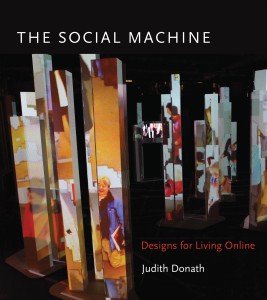Recommended
A better question for Donath, a fellow at Harvard’s Berkman Center for Internet and Society and former director of the MIT Media Lab’s Sociable Media Group, is why did we invent it? And who might reinvent it?
In this Alumni Books Podcast, Donath talks about her new book, The Social Machine, published by MIT Press in May. The book is a chronicle of her projects in social media dating from the late 1980s, long before the term was in vogue.
“The time was ready for it,” says Donath of writing a book. “[Social media] is certainly happening, and people are both enthusiastic about it but have a lot of fears and doubts about it.”
The Social Machine traces the rise of social media to its roots in Usenet groups and discussion boards to the conquests of Facebook, Twitter, and Instagram. It explores why these media thrived while others failed. Donath’s book serves as both a guide for researchers studying social media and a cautionary tale for casual users who don’t always question them critically enough.
A coder at heart, Donath thinks most about design flaws in current social media.
“I’m not an architect,” says Donath, “but I can walk into an architecture class and look at a student’s work and have something useful to say, because we all know what a house does. It’s harder with online designs, because people don’t always have a way of articulating what they want. They don’t have the experience to say ‘what does it not do that I wish it would do.’”
Beyond the book, Donath comments about the recent Facebook debacle, in which it was revealed that Facebook’s algorithms had started to test the emotional content displayed on users’ walls.
“There’s very little transparency from Facebook about how your message gets delivered. In The New Yorker, you can’t guarantee that they’ll publish you, but at least you know if they did or they didn’t.” Facebook, Donath says, has confused matters to the point that, as she puts it, “you don’t know to what extent your words are meant to be about social exchange…or about being packaged up as a form of entertainment to keep people interested in a service.”
Listen to the complete podcast here. Listen to past books podcasts on immigration, health care, and geology by visiting MITAA on Soundcloud.








